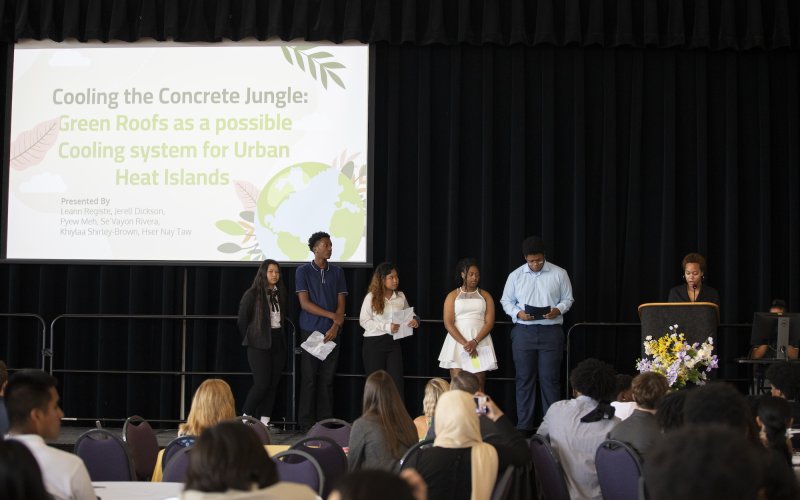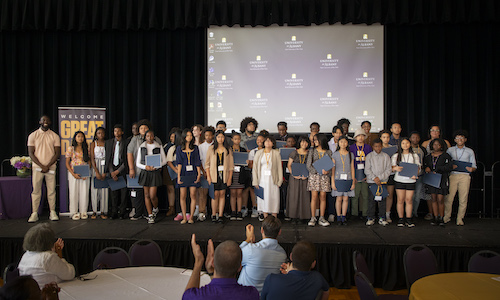Bank of America Support for UAlbany STEM Program Hits $200,000 Mark

By Bethany Bump
ALBANY, N.Y. (Aug. 24, 2023) — For three weeks in July, dozens of high school students from across the Capital Region participated in the University at Albany’s Science & Technology Entry Program (STEP) Summer Institute, conducting hands-on research in the fields of science, technology, engineering and math.
The program — part of a statewide initiative to prepare historically underrepresented and/or economically disadvantaged high school students for undergraduate careers in science, technology, engineering and math (STEM) fields and licensed professions — offers academic enrichment, mentorship and research opportunities to Capital Region students in the 7th through 12th grades, including many from the Albany City School District.
In addition to academic year programming, students have the ability to participate in summer research and get paid through the city of Albany’s Summer Youth Employment Program.
Funded primarily by the New York State Education Department, the program receives additional support from the Bank of America Charitable Foundation. This year, the foundation donated $30,000 to the program, bringing its total support for the program over the past five years to $200,000.
“I would like to thank the Bank of America for investing in our future educators and leaders. Your partnership for the last five years has allowed us to expand our program to additional students in our community,” said Mayra Santiago, director of STEP and the Office of Access and Academic Enrichment at UAlbany, at a July 28 closing ceremony for the Summer Institute held in the Campus Center Ballroom.
“This is truly an incredible program and we are so thrilled to be able to support it for our fifth year this year,” said Katie Nelson, vice president and market executive for Bank of America, Albany/Hudson Valley.

More than 100 students, family members, faculty and program supporters attended the closing ceremony, where students shared findings from their research and reflections about how the program had positively impacted their lives.
“Without the STEP program that continuously provides us with resources, access, enrichment and educational opportunities, where would we be as students?” asked Leann Registe, a rising senior at Albany High School. “Day after day we get a chance to see the values, ethics and significance of what it means to say, I am a part of STEP.”
Research spotlight
STEP students worked with UAlbany faculty and other mentors to conduct hands-on research.
One group of students worked with David Fitzjarrald, a senior research faculty member at UAlbany’s Atmospheric Sciences Research Center, to examine the effect of green roofs on urban heat islands where the dense concentration of infrastructure, people and reduced natural surfaces leads to higher temperatures.
The students placed flags and concrete mats on the green roof at ETEC in both shade and full sunlight. Each morning at 11 they would climb the roof to collect measurements such as temperature, radiation temperature and dew point.
They found that the concrete mats boasted much higher temperatures than the flags — by about 7.1 degrees in the shade and 23 degrees in the sun — supporting prior research that has found rooftop vegetation can help reduce heat and save energy.
Students also learned about 3D printing, drones, peptide synthesis, coral reef conservation, wind turbine design and air pollution during their summer research activities.
At the closing ceremony, Santiago commended students for completing such thorough research in a short period of time and offered words of encouragement to family who supported their participation in STEP.
“The students accomplished a lot in the relatively short time they were here, just four three-hour sessions a week over the course of three weeks,” she said. “The research they complete in this time is often equivalent to the amount of research undergraduate or master’s students complete over a full academic year. So, don’t doubt these students because they’ll prove you wrong.”




